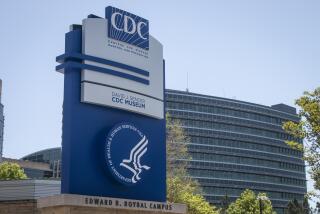House Defeats Compensation Plan for Smallpox Vaccinations
- Share via
WASHINGTON — With the government’s smallpox vaccination program already in critical condition, House members could not agree Monday on the details of a federal compensation plan that is key to its survival.
The administration-sponsored bill was defeated on a vote of 206 to 184, with opponents arguing that it was not generous enough to attract the hundreds of thousands of front-line health-care workers who have declined to volunteer for the risky vaccine. Twenty-one Republicans joined 185 Democrats to defeat the measure.
The entire California Democratic delegation voted against the bill, and they were joined by one California Republican, Rep. Randy “Duke” Cunningham of San Diego.
Rep. Lois Capps (D-Santa Barbara) said she hoped the House would soon come back with a revised plan more acceptable to nurses, firefighters, police and other emergency personnel.
“Only when our first responders have confidence in this plan will we be ready to confront the threat of a smallpox terrorist attack,” said Capps, a registered nurse.
The vote was cast after the federal Centers for Disease Control and Prevention in Atlanta sharply revised its eligibility guidelines for the program.
Last week, when two recently vaccinated health-care workers and a National Guardsman died after heart attacks, federal health officials said people with heart disease should “temporarily defer” volunteering for the vaccination. On Monday the disease control centers told state health departments that people with heart disease and those with at least three of four known risk factors -- high blood pressure, diabetes, high cholesterol and smoking -- should be “excluded” from the program.
But the vaccination program is on hold in at least nine states. It faces likely suspension in another and has been interrupted in one more.
Arizona, California, Illinois, Maine, Michigan, Nevada, New York, Vermont and Washington state have suspended their vaccination programs pending the outcome of the federal investigation of the heart attack deaths and 15 other cases in which recently vaccinated health-care workers developed chest pain or heart inflammation.
State officials in Idaho recommended that local health departments stop administering the vaccine for now, and Florida required volunteers scheduled for vaccination to go through the screening process again. Connecticut suspended its program for two days.
Even before last week’s reports of death and serious heart problems, the absence of a plan for compensating incapacitated workers had greatly hampered the Bush administration’s primary bioterrorism-preparedness program.
Fewer than 26,000 people have volunteered for the vaccine program, the initial goal of which was to inoculate up to 450,000 front-line health-care workers and up to 10 million police, fire and emergency-response personnel.
Many nurses and other health-care workers said they would not volunteer for the vaccine -- which contains a live virus -- unless they were guaranteed payment for lost wages and medical costs in the event of an adverse reaction.
The House GOP plan would have paid $262,100 to the survivors of health-care workers who died or were permanently disabled by the vaccine. For injured workers who lost more than five days of work, it would have paid up to $50,000 a year in lost wages, up to a maximum of $262,100.
A Democratic proposal, which House Republican leaders refused to let come to a vote, would provide $262,100 in death benefits and would pay up to $75,000 a year in lost wages, with no lifetime cap.
More to Read
Get the L.A. Times Politics newsletter
Deeply reported insights into legislation, politics and policy from Sacramento, Washington and beyond. In your inbox twice per week.
You may occasionally receive promotional content from the Los Angeles Times.









